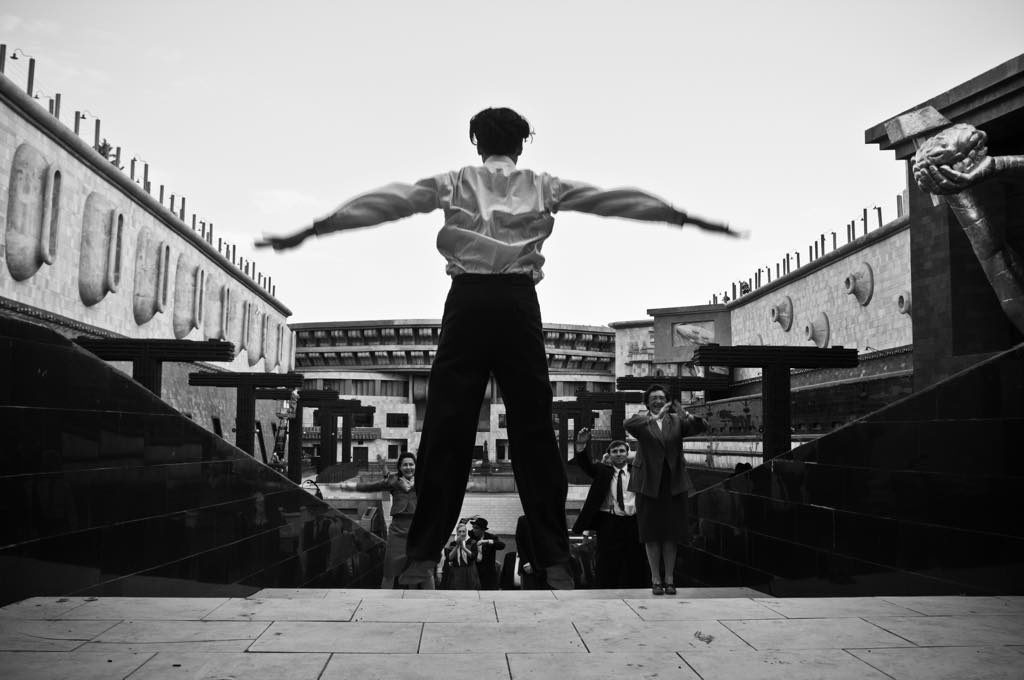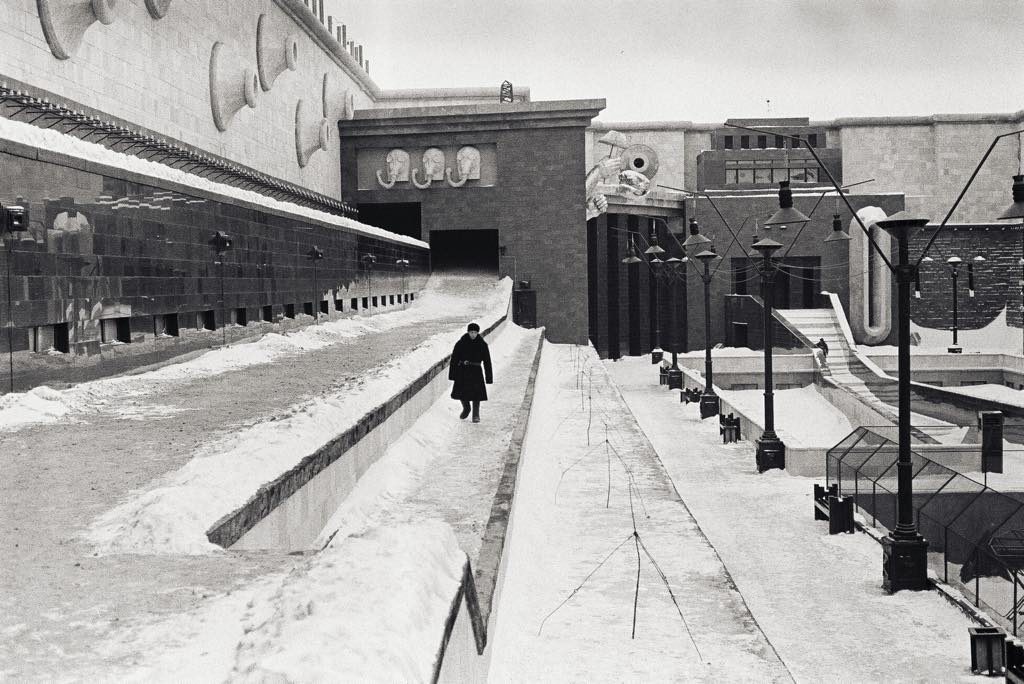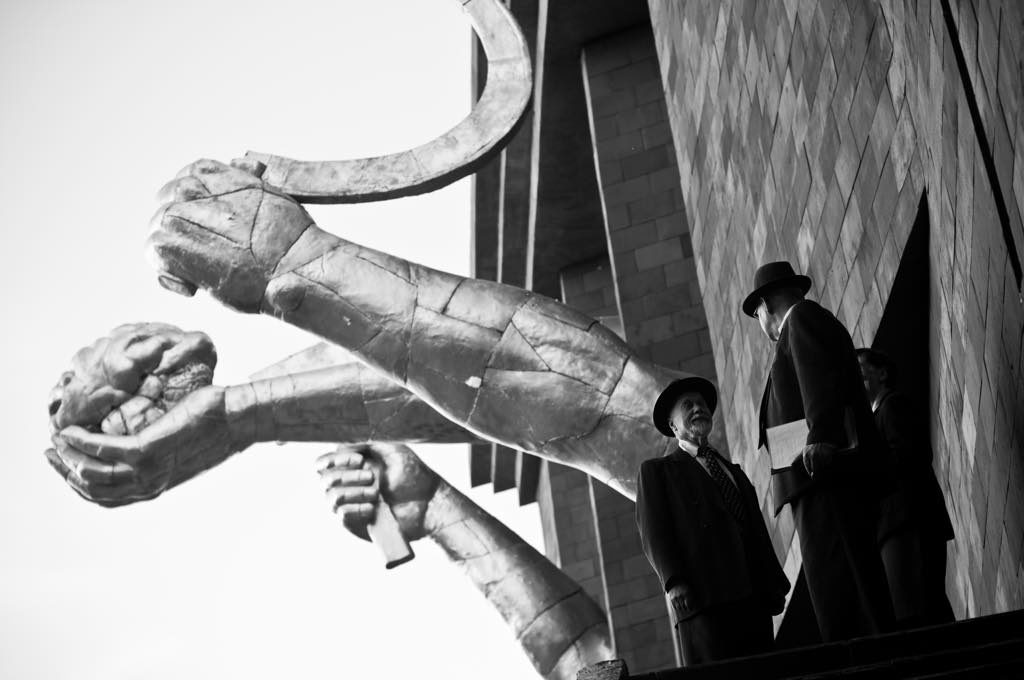
Although I had read plenty of articles about it before I went, I was still mystified and had no idea what to expect from DAU (pronounced da-o), the sprawling immersive-theater/film/installation project of Russian filmmaker Ilya Khrzhanovsky, which is being held in three locations in Paris: the Théâtre du Châtelet, the Théâtre de la Ville (even though both theaters are in the midst of renovation) and the Centre Pompidou. If you feel the same way about it, I am here to tell you that it’s worth taking a chance on entering this time warp that will send you to the USSR between the years of 1938 and ’68.
DAU invaded Paris after having been denied permission to kick off in Berlin (its other hoped-for venue is London). In Paris, it opened a day late, on January 25, but still did not have permission from the police to allow the public into the Théâtre du Châtelet, so when I went on Sunday, I was only able to visit the other two venues.
I first queued up at a kiosk on the Place du Châtelet to pick up my “visa,“ for which you must register ahead of time online when you pay your €35 for six consecutive hours, €75 for 24 hours or €150 for unlimited access. At the same time, you must fill out a long “visa application” that requires you to say to what point you agree with a number of statements, such as “Illegal forms of sex can be right for some” or “Cheating on someone isn’t black or white; it’s hard to know where infidelity begins.”
Luckily, you can respond “no opinion” or “neither agree nor disagree” if you feel, as I did, that you did not want to answer such questions being asked by a Russian organization that is said to have ties to the notorious Cambridge Analytica. (Financing for DAU was provided by Russian telecoms tycoon Sergei Adoniev.)

It’s hard to describe this massive project. It began when Khrzhanovsky, considered a megalomaniac by some, decided to make a film about the Russian physicist Lev Landau (1908-68). Rather than build a flimsy movie set like any other director, he built a real brick-and-mortar fake restricted-access scientific institute with a Soviet look (drab and utilitarian) and recruited over 400 non-actors to actually live there on and off. Then he made not one but 13 feature-length films out of footage shot of these people living out their lives in a closed-off, completely period-appropriate (down to the brand of cigarettes) world.
The films are being shown in the two Paris theaters, which are also hosting installations (Soviet-style living spaces); scarily lifelike mannequins dressed in appropriate period clothing; a restaurant serving vodka, borscht and caviar, etc. in tin dishes; a gift shop selling books, primitive kitchen utensils, canned herring and other culinary delights; and various concerts and happenings.
Unfortunately, there is currently no way of planning ahead what you will do while you are there. The promised personalized itinerary on a smartphone (visitors are required to leave their own smartphones in a locker at the entrance) that was supposed to show visitors around based on their answers to the visa questions was nowhere in sight, and there is no program. The only way to find out what is going on is to ask the many friendly young staffers dressed in overalls.

That’s how I found out where and when one of the films was about to start. It proved to be a good way to immerse myself in the atmosphere of the project.
Listening to an English translation spoken in a robotic monotone through an earpiece, I watched as a group of filmmakers were shown around the restricted-access institute and forced to write out long non-disclosure statements by hand.
This quickly got boring, as if you were going through all the red tape yourself, but things livened up as a couple of scientists were rousted out of bed in the middle of the night and arrested because their work was suspected of not being in the interests of the state. Then another scientist, who happened to be Jewish, was interrogated and humiliated but then released, presumably because his work was too important to throw him into the Gulag.
After watching some domestic squabbles taking place in the scientists’ communal living quarters, I decided to move on, not because the film wasn’t engrossing – it was, and I was beginning to feel like an inhabitant of the institute myself – but because I wanted to see what else was going on in the theater.
Two installations I tried to enter – one involved being interrogated and the other let you watch extracts of the films – had waiting lists (you must have patience in the Soviet world, but I don’t), so, at a loss, I wandered down to the gift shop, where I met a young Russian violinist who told me his orchestra, MusicAeterna, had suddenly been rushed to Paris to perform and invited me to watch them rehearse on the top floor of the theater, which has been stripped down to its raw state for the renovation.
It was a rare experience to watch as the handsome, highly demanding and intense conductor, Teodor Currentzis (who has referred to himself as a “crazy genius”), sexy in a tight black T-shirt, made the musicians go over and over the beautiful (especially in his hands) beginning of the second movement of Tchaikovsky’s Fifth Symphony.
Although he was speaking Russian, I was able to understand some of his criticisms and instructions as he sang them out to the orchestra. Only later did I discover that it was the Greek-Russian Currentzis who played Lev Landau in the film (not yet released) that was at the origin of the whole DAU project.
After that magical moment, I wandered aimlessly again until I stumbled onto another serendipitous experience. I walked into a Soviet-style sitting room where a group of people was listening to an Englishman speaking. I decided to join them after I heard him say, “Time is the universe’s way of stopping everything from happening right now.” The speaker turned out to be the scientist and “psychonaut” David Luke, author of Otherworlds: Psychedelics and Exceptional Human Experience.
A lively and fascinating discussion on the influence of psychedelic drugs on culture ensued, the last thing I had expected to encounter at DAU. In the audience in the flesh was one of the players who had been an almost constant presence in the film I had seen shortly before. His distinctively odd appearance made him instantly recognizable.
I then popped over to the Centre Pompidou to see what was going on there. In re-created living quarters from the “Institute” seen in the films, different “scientists” live for a time as in a fishbowl, unable to leave of their own volition and watched by museum visitors through oversized portholes. When I was there, the inmate was a young man who was sitting on a bed reading.

What I learned from my visit was that the best way to experience this mad, messy project is to not have too many expectations. You’ll never quite figure it out. Just keep an open mind and see what happens. It might be something wonderful like the rehearsal and the talk I fell into by accident. And who knows, you might run into one of the celebrity participants in the project, among them Brian Eno, Peter Sellars and Marina Abramović.
At the very least, you will be shocked when you leave the grim, gray world of Stalinist Russia and walk out into the streets of central Paris and see all those majestic blond-stone buildings along the Seine. We’re lucky to live in this world and not that one.
Favorite